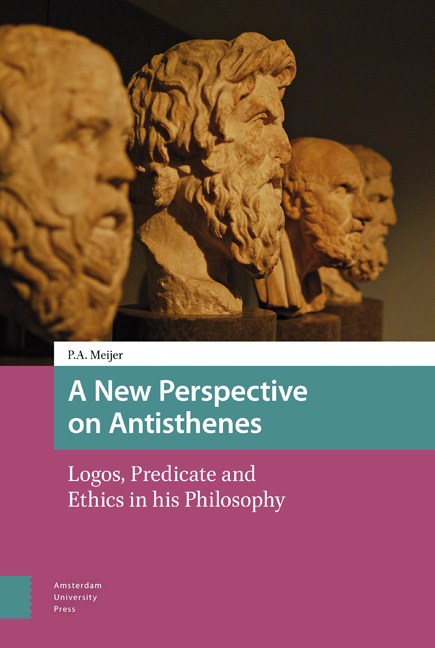Book contents
- Frontmatter
- Dedication
- Contents
- Preface
- Abbreviations
- Primary Sources – Editions Used
- Introduction
- Part I LOGOS AND PREDICATE
- Part II ANTISTHENES’ VIEWS ON THEOLOGY: HIS THEORETICAL APPROACH TO THE STUDY OF HOMER
- Part III ANTISTHENEAN ETHICS
- Epilogue: Antisthenes, an Assessment
- Appendix II The Speeches of Ajax and Odysseus
- Bibliography
- Concordance Giannantoni (SSR) – Caizzi (D.C.)
- Index
Chapter I - Theology
Published online by Cambridge University Press: 24 December 2020
- Frontmatter
- Dedication
- Contents
- Preface
- Abbreviations
- Primary Sources – Editions Used
- Introduction
- Part I LOGOS AND PREDICATE
- Part II ANTISTHENES’ VIEWS ON THEOLOGY: HIS THEORETICAL APPROACH TO THE STUDY OF HOMER
- Part III ANTISTHENEAN ETHICS
- Epilogue: Antisthenes, an Assessment
- Appendix II The Speeches of Ajax and Odysseus
- Bibliography
- Concordance Giannantoni (SSR) – Caizzi (D.C.)
- Index
Summary
Antisthenes and monotheism: was Antisthenes the first monotheist?
It will appear that what we have found out about Antisthenes’ provocative attitude and methods returns, not only in his views on theology, but also in the field of Homeric research. Theology and Homeric research are strongly connected. Antisthenes’ views on theology contain a form of monotheism, but as it turns out this is not sharply distinguished from polytheism.
Antisthenes’ understanding of the opposition between daily practice or custom (nomos) and nature (physis), which he borrowed from the Sophists, led him to a monistic concept of the godhead. This is expressed in the work On Nature (Πϵρὶ ϕύσϵως, α´ β´): ‘According to daily practice (nomos), there are many gods; according to nature (physis), only one’; or as Cicero puts it: ‘there are many popular gods, but one natural god’. Antisthenes is also reported to have said: ‘god does not resemble anyone, hence nobody can get knowledge of him from a statue’. Already in Xenophanes one encounters verses that attempt to free the gods from anthropomorphic features; however, they refer to polytheistic gods and for Antisthenes it is about the one god. With his utterances Antisthenes became the first so-called monotheist without being aware of it and without being followed in this respect either. Monotheism was still an unknown phenomenon and certainly not understood in opposition to polytheism. Furthermore, it had no future in classical antiquity because the philosophers themselves gave the gods a place in their systems, or were able to rationalize their existence within these systems, even if they assumed that one god was the greatest. As Xenophanes says: ‘One god, the greatest among gods and among men as well, both in form and power of mind not equal to the mortals’. There was no need to abolish the gods or to replace them by one god in classical antiquity. Antisthenes had no need to do so either; in his conversations the gods emerge as usual. For example, we know that when asked by a man what education his son should get, he said: ‘If he wants to live together with the gods, he needs to become a philosopher; if he wishes to be with people, a rhetor’.
- Type
- Chapter
- Information
- A New Perspective on AntisthenesLogos, Predicate and Ethics in his Philosophy, pp. 75 - 84Publisher: Amsterdam University PressPrint publication year: 2017



